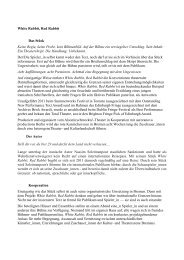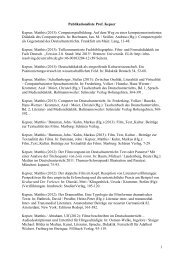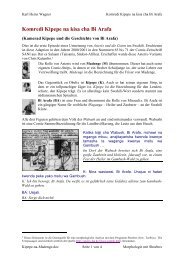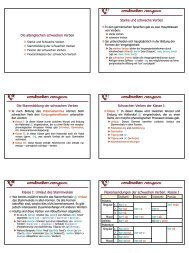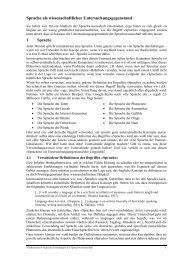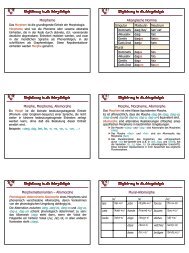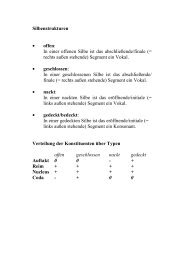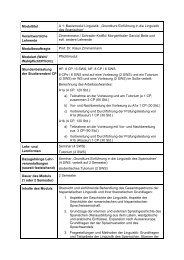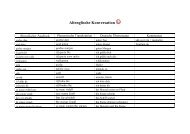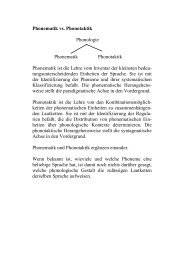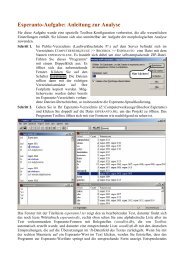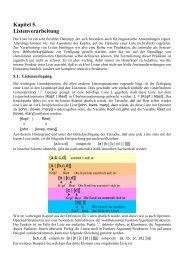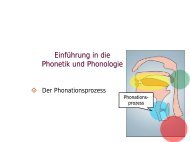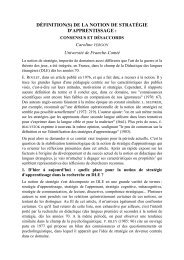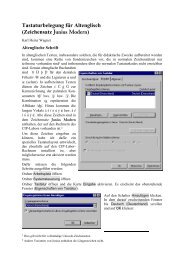Relativism and Universalism in Linguistics - Fachbereich 10 ...
Relativism and Universalism in Linguistics - Fachbereich 10 ...
Relativism and Universalism in Linguistics - Fachbereich 10 ...
Create successful ePaper yourself
Turn your PDF publications into a flip-book with our unique Google optimized e-Paper software.
40 Sections<br />
Cognitive etymology as a tool for unveil<strong>in</strong>g<br />
the non-arbitrary nature of language<br />
Fernández Sánchez, Eulalio<br />
University of Córdoba, Spa<strong>in</strong><br />
ff1fesae@uco.es<br />
Cognitivism provides science <strong>and</strong> scientists with a new paradigm where<strong>in</strong> new questions f<strong>in</strong>d<br />
their place <strong>and</strong> are wait<strong>in</strong>g for new answers. In the case of l<strong>in</strong>guistics, cognitive studies have<br />
already po<strong>in</strong>ted out the connection between language <strong>and</strong> humans’ cognitive system so that it<br />
is widely accepted that language is no longer an autonomous system, but it requires a wider<br />
approach with a clear cognitive perspective. This has led l<strong>in</strong>guists <strong>and</strong> language philosophers<br />
to reth<strong>in</strong>k the nature of language itself <strong>and</strong> ancient axiomas cease to be taken for granted. In<br />
this sense, cognitive etymology, that is, the search for the reasons why a given community<br />
chose a particular phonological sequence <strong>in</strong> order to lexicalize <strong>and</strong> make reference to a certa<strong>in</strong><br />
entity, quality or event, provides new f<strong>in</strong>d<strong>in</strong>gs that will lead us <strong>in</strong>to a reconsideration of some<br />
widely accepted universal features of natural languages, such as, arbitrar<strong>in</strong>ess <strong>and</strong><br />
conventionality. In cases of recent lexicalization processes such as telephone, television,<br />
computer <strong>and</strong> so on, the motivation or connection between the entities referred to <strong>and</strong> the<br />
phonological sequences selected is evident from a synchronic perspective, but <strong>in</strong> most cases<br />
<strong>in</strong> the lexicon of a language the connection is not that evident. So far, several cognitive<br />
studies have already stressed the motivated nature of language at the level of syntax,<br />
morphology <strong>and</strong> semantics, but the lexicon has been considered as an area where language<br />
rema<strong>in</strong>s to be arbitrary. However, cognitive etymology may lead us to f<strong>in</strong>d the motivation<br />
between the concept that has been lexicalized <strong>and</strong> the phonological sequence selected for it. In<br />
this way, cognitive etymology will draw a l<strong>in</strong>e between the non-arbitrary nature of language<br />
<strong>and</strong> its conventionality. These two concepts have been traditionally misunderstood <strong>and</strong>, <strong>in</strong> this<br />
paper, it is expla<strong>in</strong>ed how the conventional (com<strong>in</strong>g along with a community) nature of<br />
language has contributed to blur its motivation throughout time. As a result of cognitive<br />
etymology f<strong>in</strong>d<strong>in</strong>gs, language will prove to be a communication system <strong>in</strong> which<br />
lexicalization is motivated by humans’ cognitive system <strong>and</strong> which is limited <strong>and</strong> designed<br />
accord<strong>in</strong>g to humans’ physiological features <strong>and</strong> cognitive capabilities <strong>and</strong> limitations. This<br />
perspective can be useful to reconsider the nature of language <strong>and</strong> can provide new <strong>in</strong>sight<br />
<strong>in</strong>to l<strong>in</strong>guistic universals.<br />
Dualschwund als Universale im allgeme<strong>in</strong>en<br />
und <strong>in</strong>sbesondere im Deutschen<br />
Fritz, Matthias<br />
Freie Universität Berl<strong>in</strong><br />
fritzzwo@zedat.fu-berl<strong>in</strong>.de<br />
Der Dual wird als Numeruskategorie aller flektierten Wortarten für das Ur-Indogermanische<br />
rekonstruiert. Über die Zwischengrundsprachen zu den E<strong>in</strong>zelsprachen h<strong>in</strong> f<strong>in</strong>den dann<br />
Abbauprozesse statt, die über den Verlust der Kategorie <strong>in</strong> e<strong>in</strong>zelnen Wortarten <strong>in</strong> den<br />
meisten Fällen zum völligen Verschw<strong>in</strong>den des Duals führen. Innerhalb der Indogermania<br />
gibt es ganz unterschiedliche Dualsysteme: In manchen <strong>in</strong>dogermanischen Sprachen haben<br />
alle flektierten Wortarten e<strong>in</strong>en formal markierten Dual, <strong>in</strong> manchen nur e<strong>in</strong> Teil der<br />
flektierten Wortarten und <strong>in</strong> manchen nur e<strong>in</strong>e flektierte Wortart; <strong>in</strong> e<strong>in</strong>igen<br />
<strong>in</strong>dogermanischen Sprachen ist der Dual schon vor E<strong>in</strong>setzen der Überlieferung<br />
geschwunden. In den meisten <strong>in</strong>dogermanischen St<strong>and</strong>ardsprachen der Gegenwart gibt es<br />
ke<strong>in</strong>en Dual mehr; die e<strong>in</strong>zigen Ausnahmen, die den Dual bis heute bewahrt haben, s<strong>in</strong>d das



